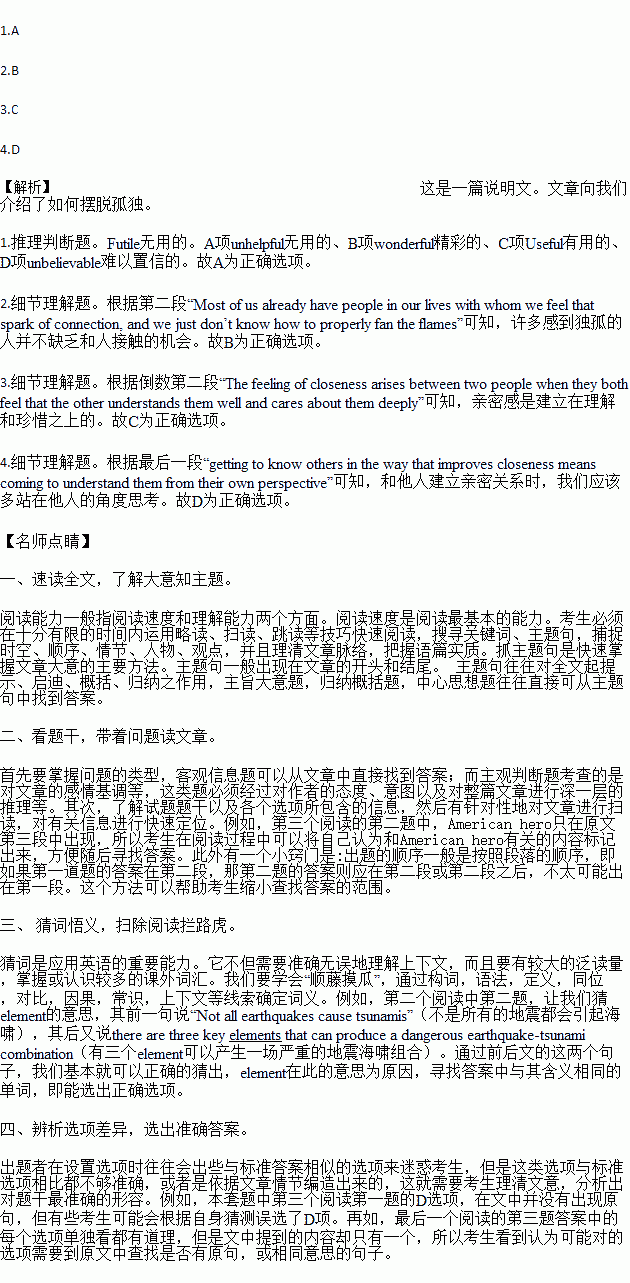题目内容
I have always been somebody who often alternated(交替)between hoping to be alone and hoping to be with others. The thing was, I only wanted to be with others in a very particular way. I wanted to feel warmth between me and the other person. I wanted to feel safe and comfortable. I wanted to feel close. If my relationship with someone didn’t have closeness, it tended to make me feel lonlier than just being alone.
I found most of the advice out there about how to get over loneliness futile. “Put yourself out there more!” the experts said. “Meet more people and you will finally find good friendships.” That only sounded reasonable. Most of us already have people in our lives with whom we feel that spark(火花)of connection, and we just don’t know how to properly fan the flames. We don’t know how to move from common interacting with someone to becoming close. In other words, I’ve found that most of us who fight against loneliness do not lack access to other people. That’s not the source of the pain.
The source of the pain is the lack of a certain feeling in our relationships. And that feeling is closeness. This feel of closeness is what you really want when you are lonely. The feeling of closeness arises between two people when they both feel that the other understands them well and cares about them deeply. I call these two important qualities of closeness “knowing and caring”.
Taken together, knowing and caring are a powerful combination. They say to the other person, “Not only do I see the real you, but I want to keep the real you well.” This is the message you will give and receive from close relationships. Getting to know others in the way that improves closeness means coming to understand them from their own perspective(角度). Closeness doesn’t have to be something that happens by accident--- it is within your control to create. Starting now, you really can stop being lonely.
1.What does the underlined word “futile” mean?
A. Unhelpful. B. Wonderful.
C. Useful. D. Unbelievable.
2.According to the author, most people who feel lonely _______ .
A. should make more new friends
B. don’t lack chances to contact other people
C. don’t know how to express their feelings
D. refuse to ch ange their attitudes toward others
ange their attitudes toward others
3.According to the passage, the feeling of closeness is ______ .
A. what we really need in our daily life
B. something we can’t control or create
C. based on understanding and valuing each other
D. the most important for building a good relationship
4.To build a close relationship with others, we should ______ .
A. learn to look after others
B. share our thoughts and feelings
C. spend more time staying with others
D. think more from others’s points of view
 天天向上一本好卷系列答案
天天向上一本好卷系列答案 小学生10分钟应用题系列答案
小学生10分钟应用题系列答案

 at’s to say, I don’t agree with you at all.
at’s to say, I don’t agree with you at all. 小区广场上都有很多人在跳广场舞,持续时间长且噪音大,给你和小区里其他人带来了很多的不便。请给小区委员会领导写封信,反映现象及其导致的不便并提出合理建议。
小区广场上都有很多人在跳广场舞,持续时间长且噪音大,给你和小区里其他人带来了很多的不便。请给小区委员会领导写封信,反映现象及其导致的不便并提出合理建议。 y which nationality is listed on your passport.
y which nationality is listed on your passport.